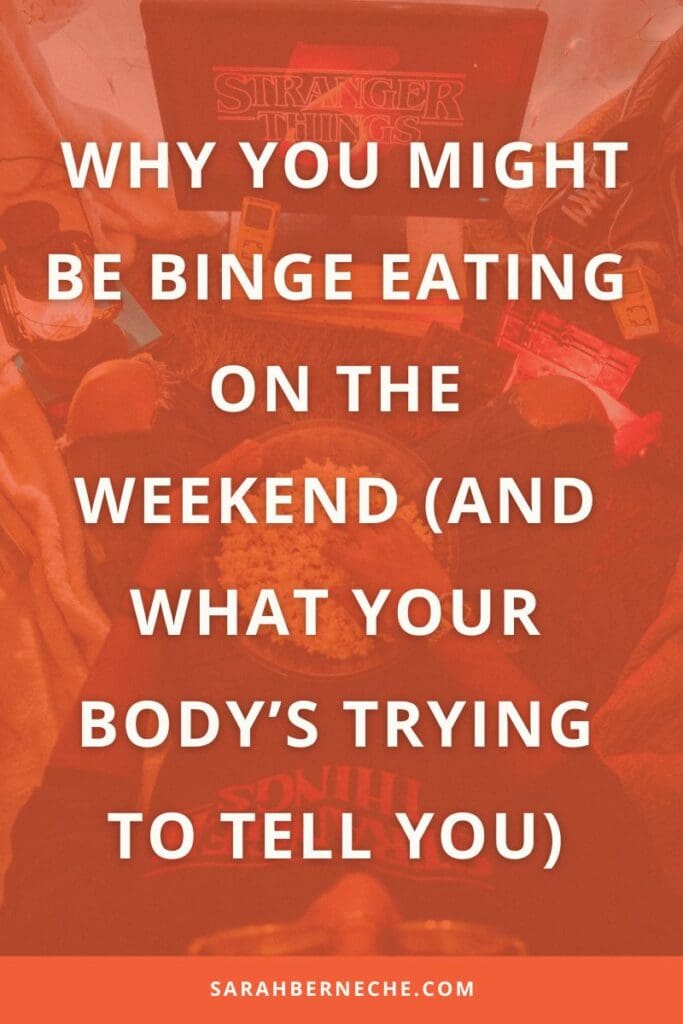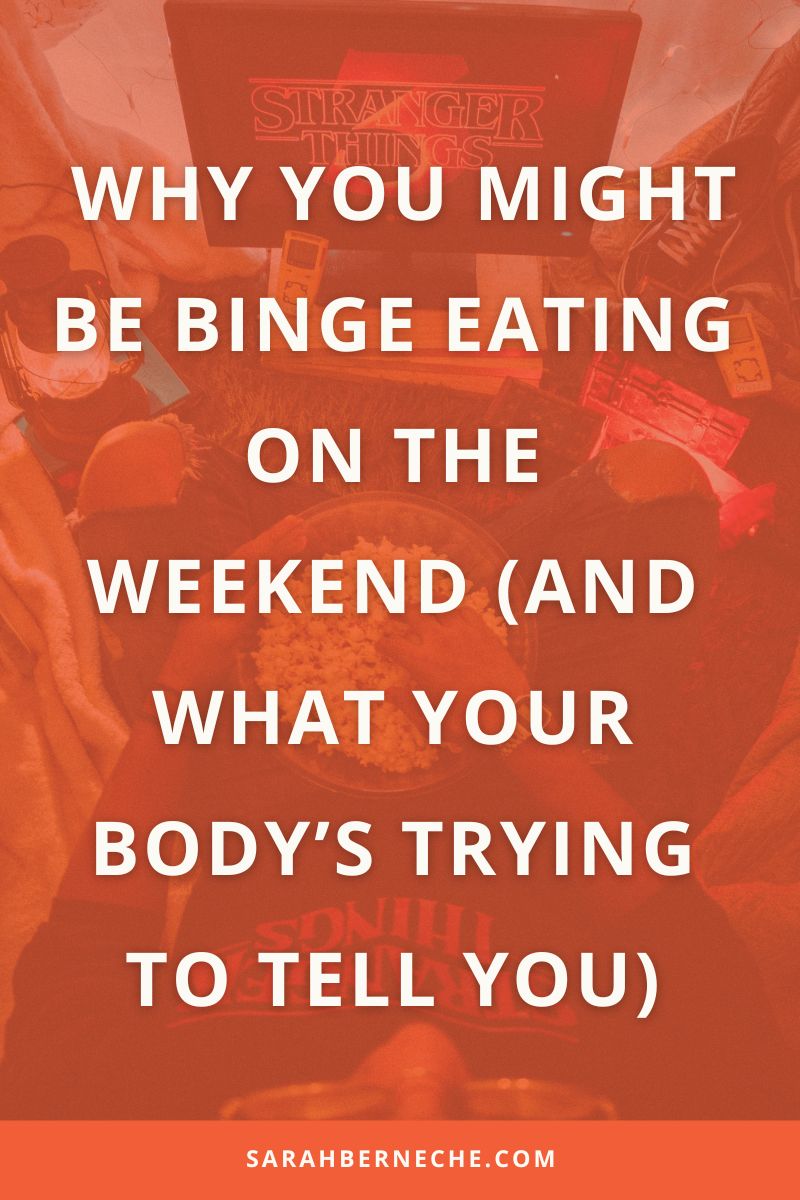If binge eating on the weekend feels like a familiar pattern, please know you’re not broken. Late-night snacking, eating past fullness, grazing all day, or feeling like you can’t stop once you start are common experiences for people struggling with the restrict-binge cycle or diet mentality.
Even though your desire to stop binge eating is totally understandable, please know these symptoms are often your body’s brilliant, adaptive response to food restriction, whether that’s physical, emotional/mental, or unintentional (or all three).

In my work with clients, weekend bingeing isn’t about “willpower” or “self-discipline.” Instead, it’s often about unmet needs, such as for food, rest, emotional expression, socialization, and other forms of self-care; disconnection; and nervous system dysregulation.
Here’s a sample menu of why you might be binge eating on the weekend despite your best efforts:
- You’re Not Eating Enough During the Week. If you spend your weekdays under-eating, skipping meals, or micromanaging portions (even unintentionally), your body will ask for more food later. That’s not a lack of control, that’s biology. It’s how your body protects you. By the time Friday night rolls around, you may find yourself obsessing over food or eating past the point of comfort. Pro tip: Instead of “saving up” for the weekend or trying to “be good” Monday through Friday, try eating enough at each meal during the week.
- You’re Restricting Emotionally, Not Just Physically. Even if you’re technically eating “enough,” if your food choices are loaded with rules (e.g. no sugar, only whole foods, nothing after 7 pm), your nervous system can still register restriction. When food feels scarce or conditional, this can still lead to binge eating or a sense of feeling out of control around food. Weekends often offer more freedom, with fewer obligations, more downtime, and a break from high-pressure perfectionism. You may feel less inhibited and more relaxed, and more prone to loosening your food rules. This can lead to binge eating if you experience guilt and shame. Lastly, if food feels more chaotic on the weekend, it might actually be a sign that your weekday structure is too tight. Pro tip: Notice how you’re relating to food during the week. Are your meals satisfying and flexible? Is pleasure part of the equation? If you’re “eating clean” but feeling disconnected or rigid, your body may be seeking balance through what looks like or is bingeing.
- You’re Using Food to Cope…Because You Need Coping. There’s nothing wrong with emotional eating. Outside of anti-fat bias, using food for comfort or care would be perceived as a relatively benign coping mechanism. It makes sense that after a stressful week of managing, masking, and/or over-performing, your body might reach for the one thing that feels grounding or stimulating. This doesn’t mean you’re failing. That said, if food is your only tool for regulation, things can feel out of balance, and you might struggle with feeling like you’re constantly using food to cope. Pro tip: Instead of asking “How do I stop eating when I’m not hungry?” ask “What else helps me feel safe, soothed, or seen?” That might look like putting on cozy clothes, crying, calling a friend, stretching on the floor, or watching your comfort show. It’s not about eliminating emotional eating. Instead, it’s about expanding your toolkit.
- You’re Operating in Stress Mode (Fight, Flight) All Week. So many folks are unknowingly white-knuckling their way through the week, driven by cortisol and anxiety. Then the weekend hits, and it’s like the nervous system finally breathes an exhale. While cravings for comfort and relief might seem sudden, they’ve often been building. Frequently, that shows up as emotional eating or binge eating. This is your body doing exactly what it’s designed to do: rebounding from depletion. While it’s so easy to blame ourselves when this happens, I invite you to consider whether the problem lies with you or with the pace and pressure you’re under. Pro tip: Instead of cracking down harder on the weekend binge eating, experiment with loosening the reins during the week. Can you pause to breathe? Take real lunch breaks? Release a little of that inner perfectionist? The more regulated your nervous system feels daily, the less extreme the weekend patterns tend to be.
- You’re Shaming Yourself. The binge-restrict cycle isn’t just about food; it’s also about the meaning you assign to it. If you feel ashamed after eating past fullness, it’s tempting to “make up for it” with more rules, restrictions, and compensation, which only sets you up to repeat the pattern. Pro tip: When you notice the urge to restrict after a binge, pause. Offer yourself some compassion. Ask yourself, What would it look like to care for myself instead of controlling myself right now?
Are there any you would add? Which resonates most with you?

Comments +